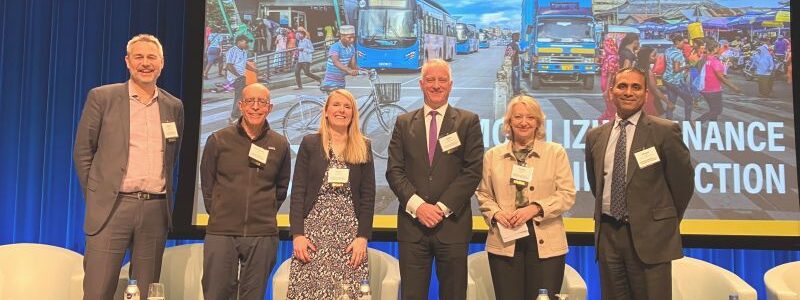This year’s Transforming Transportation focused on Mobilizing Finance for Climate Action in recognition that leveraging the full and essential potential of transport globally needs considerable resources and investment. Insights from HVT projects related to climate finance lead by the World Resources Institute (WRI) and the SLOCAT partnership were shared during the week-long event organized at the World Bank Headquarters in Washington, DC from 18th to 22nd March.
The week was kick-started with a roundtable discussion proposed by the World Bank, WRI and WBSCD that allowed international financial institutions (IFIs), private sector actors (financiers and manufacturers), philanthropies, and development non-governmental organizations (NGOs) to exchange knowledge and collaborate, beyond organizational and project silos.
Opening remarks from Rogier van den Berg, Global Director for WRI Ross Center for Sustainable Cities referenced HVT’s Accessing Climate Finance project and the need to map and understand the routes for low- and middle-income countries to better access climate finance. This was followed by early insights from the project shared by WRI’s Urban Mobility Director, Felipe Ramirez. The project is conducting research to determine the scale of finance available for transport projects by drawing on a number of databases and analysis, identifying key barriers and lessons learned to accessing climate finance.
On Tuesday, 19th March, HVT research formed part of the breakout session on Climate Finance, Institutions and Delivery Models. It is becoming clear that reducing emissions and increasing access to high quality transport systems will need innovative methods for drawing multiple sources of financing i.e., private and concessional/climate- into a blended solution supported by de-risking instruments. Governments have been relying on different institutions and delivery models to meet the challenge, while also looking for efficiency and technological innovations.
These models range from private initiatives to private-public partnerships and/or transport projects delivered by government agencies or state-owned enterprises. The national and subnational features of transport projects may also affect the decision of the delivery model. Through different examples, this session discussed achievements and difficulties of transport projects accessing climate finance from concessional and private sources.
Moderated by Holger Dalkmann, Senior Advisor for HVT and CEO of Sustain 2030, the session panel touched on the HVT work into accessing climate finance as well as the Transport Decarbonisation Index. This HVT project being delivered by the SLOCAT partnership aims to assist LMICs in Africa and South Asia in reducing greenhouse gas emissions in surface transport by providing a diagnostic toolkit called the Transport Decarbonisation Index (TDI). The TDI assesses a country’s preparedness towards achieving net-zero emissions by 2050, enabling comparisons with other nations and tracking long-term progress.
This tool helps LMICs better understand which measures are most effective for their specific circumstances, taking into account factors like development status and transport system characteristics. The TDI not only diagnoses decarbonisation but also measures progress and indicates if more stringent measures are required. It has the potential to be an important way for those seeking climate finance to show their status and situation, and to show their viability for investment and reduce risk.
Speakers in the session included Ginette Borduas Partner Head of ESG and Sustainability Meridiam; Christopher Aidun co-founder and Partner Persistent; James Leather Asian Development Bank Director Transport Sector Office Sectors Group (SG); Vikram Kumar Manager International Finance Corporation and Emma Stephenson Business Manager Sustainable Mobility Lead Shell Foundation.
The week of events in Washington brought together global leaders and transport professionals exploring how all stakeholders can mobilise resources for greener, safer, resilient transport for all, particularly in LMICs. It put a bright spotlight on the gaps in climate finance and accessing available funds, and that only with timely and innovative investment will the lifeline that transport represents be fully realised.

